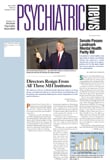The Senate Health, Education, Labor, and Pensions (HELP) Committee unanimously passed a bill last month designed to help Americans suffering from psychological trauma arising from terrorist attacks against the United States.
“The bill is an important step toward providing the funding necessary to respond to the enormous mental health needs arising from the World Trade Center disaster and to begin to prepare for possible future attacks of terrorism. I am certain the psychiatric leadership is up to the task,” Spencer Eth, M.D., told
Psychiatric News. Eth, who testified before the Senate HELP committee last month (
Psychiatric News, October 19), is medical director of behavioral health services at St. Vincent’s Hospital in New York City. He is also a former member of APA’s Committee on Psychiatric Dimensions of Disasters.
A Pew Charitable Trust study recently found that 71 percent of Americans have had trouble sleeping or concentrating or have felt depressed since the September 11 attacks.
APA has been advocating for passage of the Post-Terrorism Mental Health Improvement Act, introduced by Sens. Edward Kennedy (D-Mass.), Paul Wellstone (D-Minn.), Hillary Rodham Clinton (D-N.Y.), Pete Domenici (R-N.M.), Charles Schumer (D-N.Y.), John Warner (R-Va.), and Pat Roberts (R-Kan.) At press time in late October, the bill’s cosponsors were seeking to attach the bill to an appropriations bill pending in the Senate.
The bill, which had not been assigned a number at press time, would authorize grants to state and local governments to develop coordinated disaster responses including training mental health professionals to provide crisis counseling and public information. These individuals also would be trained to look for signs of psychological distress that require clinical intervention and possibly long-term treatment.
The measure also would
• establish the Mental Health Disaster Clearinghouse to collect and disseminate information on postdisaster mental health needs to education agencies and state and local governments;
• award grants to state and local governments and other public groups to find and provide treatment for individuals who need mental health services resulting from terrorist acts;
• award Department of Health and Human Services grants to study the mental health impact of terrorism; and
• reauthorize appropriations for $40 million for the treatment of children who experience violence-related stress and establish similar programs for adults who experience violence-related stress. ▪

